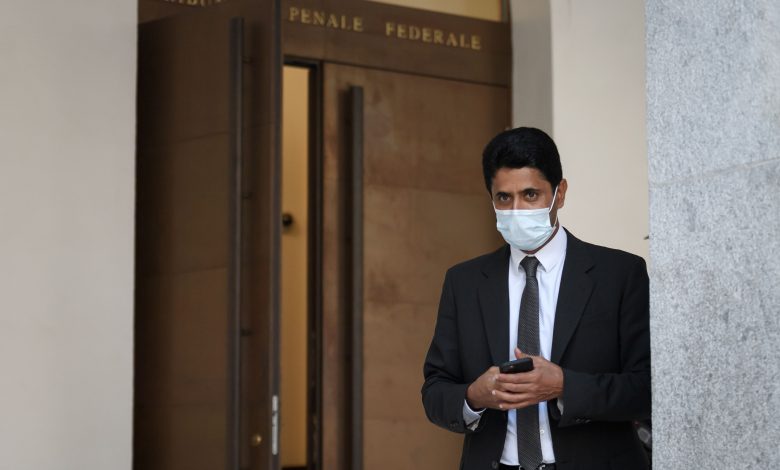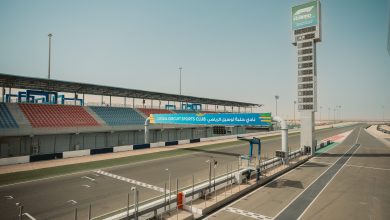
“Don’t tell Nasser al-Khelaifi” New information on the “Super League” scenes
“لا تخبروا ناصر الخليفي”.. معلومات جديدة عن كواليس “السوبر ليغ”
Bloomberg
The plan was simple: Persuade a dozen of Europe’s top soccer clubs to break away and upend the world’s most popular sport.
Over the winter the Super League sent French champion Paris Saint-Germain—along with the other prospective teams—pitch documents detailing how lucrative the new competition could be, according to people familiar with the proposal. But already cracks were appearing.
Those behind the rebel league feared PSG Chairman Nasser Al-Khelaifi, who had spent months rebuilding his reputation after being cleared in a high-profile bribery case, would leak the plans to European soccer officials. PSG was cut out of the talks. The new plan was to give the French club 14 days to sign up for the project once it had been announced, the people said, who asked not to be named as the discussions were private.
It backfired spectacularly. After all corners condemned the Super League, what followed was a last-ditch attempt to coax Qatari-owned PSG to sign up, including unfounded suggestions that German giant Bayern Munich might do a U-turn and join.
The last straw for Al-Khelaifi was when the would-be president of the new league, Real Madrid’s Florentino Perez, told Spanish television that PSG hadn’t actually been invited.
Less than 48 hours after the Super League was unveiled late on Sunday, PSG joined the chorus of opposition from politicians and the soccer world and precipitated its collapse before anyone kicked a ball.
The plan “doesn’t resolve the issues currently facing the football community, but instead is driven by self-interest,” Al-Khelaifi said in a statement on Tuesday afternoon. By the end of the day, the six English clubs—half the roster who had declared their involvement—had all jumped ship and only the Spanish and Italians remained.
It was a project that had been three years in the making, picked up momentum in January, and then was backed by 4 billion euros ($4.8 billion) from U.S. bank JPMorgan Chase & Co. Yet confusion, a public relations calamity, and an angry backlash turned it into a failed coup that had spectacularly misread the emotional cauldron of European football.
“I don’t think there has ever been a greater misjudgment than this in the sports industry,” said Paul Barber, the chief executive of English Premier League club Brighton.
The aim was to create an elite group of 20 clubs in total to rival UEFA’s Champions League that could guarantee games and revenue for years to come. A sport known for inflated player salaries and eye-watering transfer fees, the pandemic has exacerbated the parlous state of many clubs’ finances. The rationale was to bring in more U.S. money by coming up with more of an American sports model.
It was driven by Perez at Real Madrid and his Italian ally, Juventus Chairman Andrea Agnelli, and supported by the U.S. owners of English clubs. The venomous reaction to their plan centered on two things: the perception of greed and the idea of a cartel, with 15 clubs never having to face failure to qualify for the midweek tournament.
Read More: Agnelli Faces Reckoning of Bad Bet as His Soccer League Dream Implodes
They are now left nursing the fallout, which includes losing influence in their domestic leagues and at UEFA, European soccer’s governing body. The U.K. government is threatening new regulations, with fans on boards, caps on ticket prices, and an examination of different models of club ownership.
“It is clear we misjudged the magnitude of feeling that this deal would create, and we will learn from this experience as a company,” JPMorgan’s co-president, Daniel Pinto, said in a statement to Bloomberg News on Thursday. “In the end, football fans were heard loud and clear.”
The idea for a Super League in some form had been floating around for a long time. It was also no surprise that a proposal would coincide with a decision by UEFA, European soccer’s governing body, to expand and revise the Champion’s league, the continent’s most lucrative tournament.
But the way it was handled ensured a vitriolic response, according to one person involved in the PR operation. The owners of the English clubs—Arsenal, Chelsea, Liverpool, Manchester City, Manchester United, and Tottenham Hotspur—declined to front the project and extol how they wanted to fix the sport and invest in its grassroots, the person said.
The first communication should have said the league would be born after consultation with the fans and politicians. Yet the framing of the announcement took 10 hours to agree on, and by which time the ship had sailed. It meant the project was dead in the water very quickly, the person said, declining to be identified by name because of the sensitivities.
The statement went out at 11:20 p.m. U.K. time on Sunday night, hours after the media had got wind of it. UEFA was quick to condemn it, calling it cynical “when society needs solidarity more than ever.” It threatened to ban players at the clubs from participating in its competition for national teams.
And the outcry escalated, both political and from within football. French President Emmanuel Macron hit out and praised PSG for not being involved. The riposte in the U.K. was the strongest.
Some British ministers were aware of the plan earlier in the week, though Prime Minister Boris Johnson only became alert to the rebel league on Sunday. His government threw its full force behind defeating the plan.
Johnson tweeted that “the clubs involved must answer to their fans and the wider footballing community before taking any further steps” and on Monday, Culture Secretary Oliver Dowden excoriated the plan in Parliament.
Johnson’s senior aide, Eddie Lister, told the United Arab Emirates on a trip to the Gulf that Manchester City’s participation would damage the country’s relationship with the U.K., according to a person familiar with the visit. City’s owner, the Abu Dhabi United Group, is controlled by Sheikh Mansour bin Zayed Al Nahyan, the UAE’s deputy prime minister.
The political reaction spooked English clubs and ultimately pushed the first two teams—Manchester City and Chelsea—to prepare to withdraw, according to a person familiar with the situation. The problem was that nobody had seen the universal rejection coming, the person said.
The uproar was broadening. By Monday evening, Gary Neville, a former Manchester United player who is a popular pundit in the U.K., was in full flow. He deplored the leaders of the Super League for trying to overhaul the country’s most popular game without having the bravery to defend the plan publicly. Liverpool coach Juergen Klopp also expressed his antipathy toward the plan as his team visited Leeds United for a match.
The English Premier League called an emergency virtual meeting for Tuesday. The chiefs of 14 clubs were in attendance, with the six Super League signatories absent. “In nearly 25 years in football I have never been at a meeting where there was such a consistency of views on one issue and total condemnation,” said Barber, the Brighton chairman.
But by the end of the day, it would all unravel. PSG had been a necessary catch of the Super League. The club is the biggest in France, its Qatari owners also run sports broadcaster BeIN, and its Chairman Al-Khelafi is influential in UEFA. His statement caused a stir.
By that evening, Barber was headed for Chelsea’s stadium in London for the game against Brighton. Hundreds of angry Chelsea supporters had been gathering since early afternoon and billionaire Russian owner Roman Abramovich was getting uneasy.
Barber agreed to talk to broadcaster Sky appealing for Chelsea and the other rebel clubs to abandon quickly and mitigate the damage. The interview was pulled. The news was already filtering through that Chelsea and Manchester City were getting cold feet.
Manchester City had been brought into the project late and the club was worried it might miss out should all the other big teams in Europe sign up, according to a person familiar with the deliberations. Chelsea’s issue was that Liverpool, Manchester United, and Arsenal—all of whom have American owners—had been touting the plan for months and it too needed to move fast, a person familiar with the club said. Spokespeople for both clubs declined to comment.
The situation, though, had become untenable. Events snowballed. Once Manchester City had pulled out, officials at the Super League already knew it was unsalvageable, according to one person familiar with their thinking. Chelsea followed.
Manchester United announced the departure of Ed Woodward, its executive vice chairman, before also withdrawing. Tottenham Hotspur Chairman Daniel Levy said he regretted the “anxiety and upset” caused.
By Wednesday morning, Spanish team Atletico Madrid and the Italians also quit. It left only Real Madrid and Barcelona, both of whose chiefs have defended the plan and vowed to push for a new league in some form. None of the 12 teams has withdrawn from the company that owns the Super League and is registered in Spain, according to a person with knowledge of the legalities.
But others were celebrating. Prime Minister Johnson was in No. 10 Downing Street when the news came in that it had all fallen apart. While not a soccer fan himself, the premier was aware of the strength of feeling—and perhaps the political kudos from siding with the soccer public. “Great victory!” he burst out, according to a witness. “People’s government!”
الحرة / ترجمات
دبي: كشفت وكالة “بلومبيرغ” إن الأندية المنسحبة من دوري السوبر الأوروبي لم تتقدم باستقالتها رسميا من الشركة المالكة للدوري الانفصالي الذي أثار ضجة واسعة في الأسبوع الماضي.
وقالت الوكالة الأميركية نقلا عن مصدر مطلع على الجوانب القانونية، إن الأندية الـ 12 التي أعلنت عن تأسيس دوري السوبر الأوروبي المنافس لدوري أبطال أوروبا، لم تنسحب من الشركة المالكة للبطولة والمسجلة في إسبانيا بصفة قانونية.
وبحسب “بلومبيرغ”، فإن الأندية التي تقف على دوري السوبر الأوروبي الذي ولد ميتا، كانت تخشى من أن يقوم رئيس نادي باريس سان جيرمان، ناصر الخليفي، بتسريب خطها لمسؤولي الاتحاد الأوروبي لكرة القدم (اليويفا).
وأشارت الوكالة إلى أن النادي الفرنسي استبعد من محادثات خطط تأسيس الدوري الانفصالي بعد تلك المخاوف، فيما كانت الخطة الجديدة هي منح باريس سان جيرمان 14 يوما للاشتراك في المشروع بمجرد الإعلان عنه، على حد قول الأشخاص الذين طلبوا عدم ذكر أسمائهم.
لكن رئيس نادي ريال مدريد الإسباني والقائم على المشروع الجديد، فلورنتينو بيريز، قال للتلفزيون الإسباني إن باريس سان جيرمان لم تتم دعوته بالفعل.
ويحظى القطري ناصر الخليفي بعضوية اللجنة التنفيذية بالاتحاد الأوروبي لكرة القدم، والأربعاء، عين أيضا رئيسا لرابطة الأندية الأوروبية خلفا للإيطالي، أندريا أنييلي، أحد أعمدة إطلاق مشروع “السوبر ليغ”.
وبعد أقل من 48 ساعة من الكشف عن دوري السوبر الأوروبي في وقت متأخر، الأحد الماضي، انضم باريس سان جيرمان إلى المعارضين من الرياضيين والسياسيين وعجّل بانهياره قبل أن يركل أحد الكرة.
كان دوري السوبر مشروعا استغرق إعداده ثلاث سنوات، واكتسب زخما في يناير، قبل أن يحصل على دعم قدره 4 مليارات يورو (4.8 مليار دولار) من بنك “جي بي مورجان” الأميركي.
ومع ذلك، فإن الارتباك وكارثة العلاقات العامة ورد الفعل الغاضب حول المشروع إلى انقلاب فاشل أساء بشكل مذهل لكرة القدم الأوروبية.
وتعرض بنك “جي بي مورغان” لحملات قاسية على مواقع التواصل الاجتماعي، لاسيما من العديد من الشخصيات الإعلامية والرياضية والاقتصادية البارزة، ما دفع بالمصرف إلى إصدار بيان، الجمعة، يوضح فيه موقفه بشأن ما حدث.
وجاء في بيان المصرف الأميركي: “من الواضح أننا أخطأنا في تقدير نظرة مجتمع كرة القدم الأوسع إلى هذه الصفقة وكيف يمكن أن تؤثر عليهم في المستقبل”.
وكان 12 ناديا عملاقا في أوروبا، أحدثوا زلزالا كبيرا في عالم كرة القدم، عندما أعلنوا، الأحد الماضي، إطلاق مسابقة جديدة تسمى “دوري السوبر ليغ” الأوروبي لكرة القدم لتكون موازية لدوري أبطال أوروبا وذلك بهدف الخروج من الأزمة المالية التي فاقمتها جائحة كورونا.


